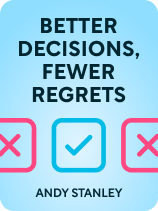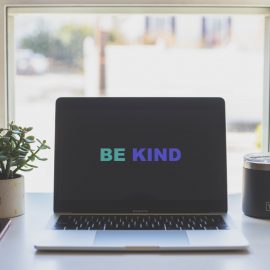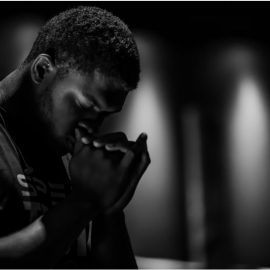

This article is an excerpt from the Shortform book guide to "Better Decisions, Fewer Regrets" by Andy Stanley. Shortform has the world's best summaries and analyses of books you should be reading.
Like this article? Sign up for a free trial here.
How can you recognize bad decision-making in your life? How can you avoid it?
Bad decision-making often falls into three categories: unnecessary purchases, unhealthy relationships, and harmful habits. What these have in common is that they cause regret.
Learn how to avoid regret by making better decisions.
What’s a Bad Decision?
What does bad decision-making look like? A bad decision creates regret. Bad decisions can be inconsequential or very consequential—but either way, they make you want to go back and make a different choice. However, you only regret a decision after you’ve made it. So while regretting a decision might help you if you face a similar choice in the future, it can’t keep you from making a decision you’ll regret in an unfamiliar situation. (Shortform note: Some experts describe regret as a time machine: an emotion we feel in the present about something that happened in the past that helps us to make better choices in the future.)
(Shortform note: Some experts say that not only are regrets inevitable, but it’s crucial to build the skill of learning from your regrets. In If Only…, psychologist Robert L. Leahy writes that we often regret things we did and things we didn’t do. In both cases, your regrets can help you learn from your mistakes. To learn from regret, Leahy recommends avoiding assumptions about what might have been, practicing gratitude for the good things in your life, accepting that regret is inevitable, and learning to tolerate tradeoffs and compromises—to “satisfice,” or accept a good-enough option, rather than holding on to unrealistic expectations and searching for perfection.)
Certain types of decisions tend to be the ones that we regret later, so they’re the ones you should be most careful with. According to Stanley, the decisions that most often lead to regret tend to fall into one of three categories:
1) Purchases We Regret
First, we often make purchases we’ll regret. Sometimes these purchases are small and harmless, like a marked-down sweater in a color you’ll never wear or a novel you’re only buying because everyone else is reading it. These aren’t great decisions, and they’re a waste of money. But they’re small enough that you can laugh about them later—after you’ve found a new home for the sweater or book. Sometimes, though, the purchases you regret are bigger. For example, you might buy a car that costs far more than you budgeted or book a vacation that costs more than you can afford. These decisions involve large enough amounts of money that they can become setbacks from your financial goals.
(Shortform note: Psychologists say that we often rationalize our choices so we can avoid buyer’s remorse, the feeling of regretting a purchase. A group of Yale researchers, which included Against Empathy author Paul Bloom, also observed this tendency in capuchin monkeys. They offered the monkeys red, green, and blue M&Ms. If a monkey chose a red M&M over a blue one, he would rationalize that choice by devaluing blue M&Ms and rejecting them in the future. We do the same thing so we can avoid wondering if we made the wrong choice, including with our purchases—especially those that cost a lot more than a pack of M&Ms.)
Stanley explains that whether what you buy (and later regret) is big or small, you talk yourself into the purchase because it’s something you want. The feeling of really wanting something wins out over the knowledge that you don’t need it or can’t afford it. And it’s only later, once you have a bit more perspective, that you regret it.
(Shortform note: When Stanley explains that we make regrettable decisions because we want something and ignore the downsides, he’s describing motivated reasoning—the same phenomenon that experts say led people to prioritize their desire for normalcy during the Covid-19 pandemic. I Contain Multitudes author Ed Yong lists “the normality trap” as one of the cognitive errors that tripped up Americans’ intuitive response to the pandemic. As the virus disrupted the status quo, people wanted so badly for life to return to normal that they behaved in ways that let the virus spread—a decision some of them would later regret.)
2) Relationships We Should Leave
Second, we talk ourselves into staying in relationships we should leave. We often regret holding onto relationships (or situationships) long after they’ve run their course. For example, you might waste months dating someone whom you know, deep down, isn’t the right partner. Or perhaps you put years of effort into a one-sided friendship with a person who doesn’t value you. When we talk ourselves into staying in relationships, we later regret it. We ignore obvious cues that the relationship isn’t a good fit, telling ourselves a more positive story about the other person and the prospects for our future with them.
(Shortform note: It can be hard to tell when to let go of a relationship. In Minimalism, Joshua Fields Milburn and Ryan Nicodemus recommend evaluating your relationships to determine whether they have a positive, negative, or neutral effect on your life. Positive relationships make you happy and help you grow, while negative ones make you feel unhappy and keep you from growing. You can strengthen relationships you value by working to better understand the other person. But Milburn and Nicodemus note there’s a limit to what understanding can achieve: If the person’s behavior is harmful to you or others, or if they have values you don’t want in your life, it might be time to walk away so you don’t regret staying.)
3) Habits That Can Harm Us
Third, we easily fall into habits that can harm us, and we regret it later. When we indulge our bad ideas repeatedly, we make the same poor decision so many times that a small vice becomes a harmful habit or even an addiction. Imagine making a habit of leaving major projects unfinished until the night before the deadline: You’ll likely end up letting your colleagues down and hurting your reputation at the office. Similarly, if you fall into the addictive pattern of spending hours scrolling through social media at night, you’ll find it harder to be present with your family and miss out on time with the people you love. These decisions seem small in the moment, but they add up to habits that are hard to break.
(Shortform note: It’s surprisingly easy to form bad habits. In The Power of Habit, Charles Duhigg explains that every habit starts with a conscious decision you make to fulfill a need or act on a motivation. Over time, as you make the same decision over and over, your brain stores it as an automatic pattern of behavior, creating a habit. As Duhigg explains it, habits enable the decision-making part of the brain to work less, and this switch away from conscious decision-making can make habits challenging to break. Duhigg says that if you want to break a habit, you should figure out what triggers it and what function it serves. Then you’ll be able to see why you formed the habit and work to replace it with a healthier response.)
You might notice a pattern in these explanations for why we make these three kinds of bad decisions: We tend to tell ourselves that we want something—to have a material object, to hold onto a relationship, or to keep indulging in a harmful habit—and that it’s OK to go for it, even when we know better. That’s because we’re great at deceiving ourselves.
| What Horror Movies Can Teach Us About Decision-Making We often make bad decisions because we want something, and we’re willing to take questionable actions to get it. To see how this works, you could rewatch your favorite horror movie. The characters in these films are notorious for their bad decisions. They act on their immediate desires (maybe to meet up with friends in the woods or to evade a monster), not on rational judgments. They don’t think ahead about what dangers might lurk in the woods, or why it’s not a great idea to retreat deeper into an abandoned house. Like these characters, we often forge ahead and assume everything will turn out fine. But you don’t survive the haunted house or the zombie apocalypse if you just react in the moment. We don’t make bad decisions because we’re trying to get ourselves into trouble. Instead, we make bad decisions because we’re so strongly driven by what we want in the moment that we can’t see beyond those desires. |

———End of Preview———
Like what you just read? Read the rest of the world's best book summary and analysis of Andy Stanley's "Better Decisions, Fewer Regrets" at Shortform.
Here's what you'll find in our full Better Decisions, Fewer Regrets summary:
- What it means to make a "good" decision
- The three most common categories of bad decisions
- How to overcome your cognitive biases to make better decisions






